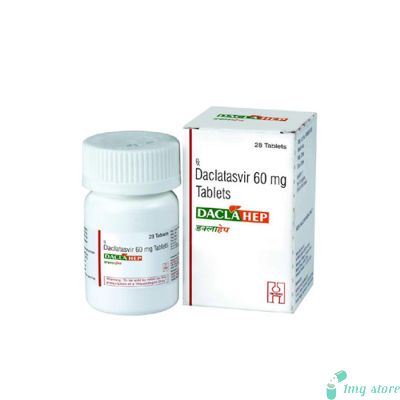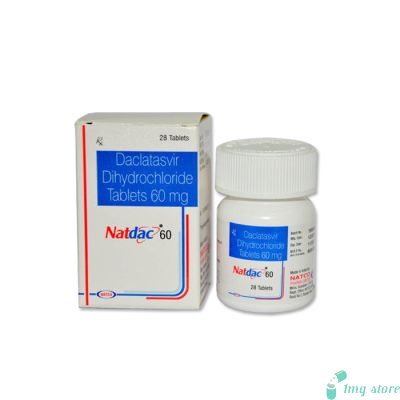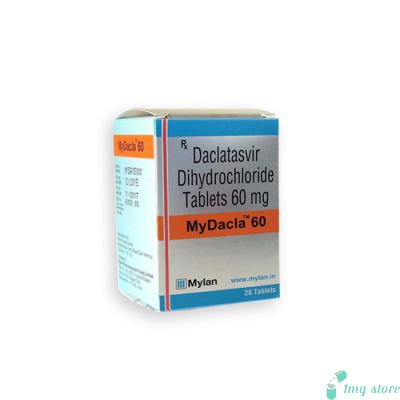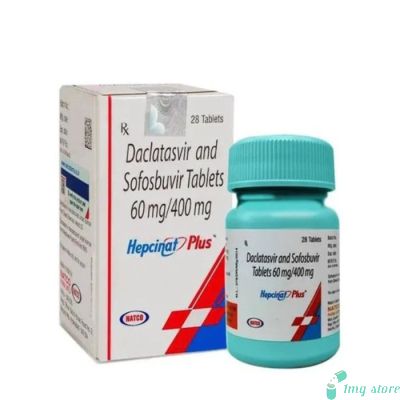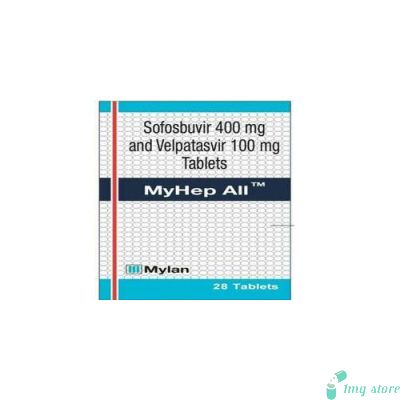Hepcdac Tablet (Daclatasvir)
Daclatasvir Tablet, commonly marketed under the brand name Hepcdac and Daklinza, is a prescription medication used in the treatment of chronic hepatitis C virus (HCV) infection. It belongs to a class of drugs known as direct-acting antivirals (DAAs) and is primarily used in combination with other antiviral medications to enhance treatment efficacy.
Introduction of Hepcdac Tablet (Daclatasvir)
Daclatasvir Tablet, commonly marketed under the brand name Hepcdac and Daklinza, is a prescription medication used in the treatment of chronic hepatitis C virus (HCV) infection. It belongs to a class of drugs known as direct-acting antivirals (DAAs) and is primarily used in combination with other antiviral medications to enhance treatment efficacy. Daclatasvir works by targeting a specific protein in the Hepatitis C virus, preventing its replication and further spreading within the body. This medication has been approved by regulatory authorities for the treatment of hepatitis C genotype 1 and genotype 3 infections.
Dosage Information:
The dosage of Daclatasvir Tablet (Hepcdac) may vary depending on individual patient factors, such as the specific genotype of the hepatitis C virus, the presence of liver cirrhosis, and any coexisting medical conditions. It is crucial to follow the prescribed dosage instructions provided by the healthcare professional or mentioned on the product label. The standard dosage regimen for Daclatasvir is a 60 mg tablet taken orally once daily with or without food. The duration of treatment may range from 12 to 24 weeks, depending on the specific treatment plan and the response of the patient to the medication.
Daclatasvir Cost:
To check the cost of the Daclatasvir Tablet (Hepcdac) and other related information, you can visit our website - 1mgstore.com. You will get the most accurate and up-to-date pricing details based on your location and specific circumstances.
Daclatasvir Reviews:
Daclatasvir has been extensively studied in clinical trials and real-world settings, and overall, it has shown favorable outcomes in the treatment of chronic hepatitis C. Patient reviews and experiences may vary, and it is important to consult with healthcare professionals for personalized advice. However, many individuals have reported successful treatment outcomes and improvements in their liver health after using Daclatasvir in combination with other antiviral medications.
Daclatasvir and Sofosbuvir:
Daclatasvir/Daklinza is often used in combination with sofosbuvir, another direct-acting antiviral agent, to enhance treatment efficacy against hepatitis C virus infection. The combination of Daclatasvir and sofosbuvir has shown high cure rates and improved treatment outcomes for patients with different genotypes of hepatitis C, including genotype 1 and genotype 3 infections. This combination therapy has become one of the standard treatment regimens for hepatitis C patients, offering improved convenience, reduced treatment duration, and increased effectiveness compared to older treatment options. Furthermore, Daclatasvir is considered a Life-Saving drug for individuals with chronic hepatitis C infection. Hepatitis C can lead to severe liver damage, cirrhosis, and an increased risk of liver cancer if left untreated.
In conclusion, Daclatasvir Tablet (Hepcdac) is a prescription medication used in the treatment of chronic hepatitis C virus infection. It is primarily used in combination with other antiviral agents, such as sofosbuvir, to enhance treatment efficacy. Daclatasvir is effective against genotype 1 and genotype 3 hepatitis C infections and has shown favorable outcomes in achieving sustained virologic response. The dosage and treatment duration may vary depending on individual patient factors. To check the cost of Daclatasvir and for further information, you can visit our website or consult with your healthcare provider. Patient reviews have generally been positive, and the combination of Daclatasvir and sofosbuvir has become a standard treatment regimen for hepatitis C patients.
Some of the primary precautionary measures to be taken while using Hepcdac Tablet (Daclatasvir)
- Allergies: Before starting Daclatasvir treatment, it is important to inform your healthcare provider about any known allergies to Daclatasvir or any other medications. This is essential to prevent any potential allergic reactions or adverse effects.
- Medical History: Inform your healthcare provider about your complete medical history, including any pre-existing liver or kidney conditions, heart problems, or any other significant medical conditions. This information will help your healthcare provider determine the appropriate dosage and monitor your response to treatment closely.
- Pregnancy and Breastfeeding: Daclatasvir/Daklinza, may cause harm to unborn babies. It is important to discuss with your healthcare provider if you are pregnant, planning to become pregnant, or breastfeeding. Your healthcare provider will assess the potential risks and benefits and determine if Daclatasvir is suitable for you.
- Concomitant Medications: Inform your healthcare provider about all the medications you are currently taking, including prescription drugs, over-the-counter medications, herbal supplements, and vitamins. Certain medications may interact with Daclatasvir and affect its effectiveness or increase the risk of side effects.
- Drug Resistance: Daclatasvir should be used in combination with other antiviral medications as prescribed by your healthcare provider. It is crucial to follow the prescribed treatment regimen and complete the full course of treatment to reduce the risk of developing drug resistance.
Some of the specific indications for Daclatasvir Tablet (Hepcdac) include:
- Treatment of Chronic Hepatitis C: Daclatasvir Tablet is primarily used in combination with other antiviral medications, such as sofosbuvir, ribavirin, or peginterferon alfa, for the treatment of chronic hepatitis C virus infection. It is effective against genotype 1 and genotype 3 infections, which are the most common types of hepatitis C. The combination therapy aims to achieve sustained virologic response (SVR), which indicates the absence of detectable hepatitis C virus in the blood after completion of treatment.
- Genotype 1 Infection: Daclatasvir/Daklinza, in combination with sofosbuvir and possibly with ribavirin, is used for the treatment of genotype 1 hepatitis C infections. This combination has shown high efficacy and has become one of the standard treatment regimens for genotype 1 patients.
- Genotype 3 Infection: Daclatasvir, when combined with sofosbuvir, is a recommended treatment option for Genotype 3 hepatitis C infections. This combination has demonstrated high cure rates and improved treatment outcomes for patients with genotype 3 infection.
- Liver Cirrhosis: Daclatasvir-based regimens, in combination with other antiviral agents, have shown efficacy in treating hepatitis C patients with compensated liver cirrhosis. These treatment options aim to achieve viral eradication and prevent further progression of liver disease.
- HIV Coinfection: Daclatasvir, when used in combination with other antiviral agents, has also been studied and found effective in treating hepatitis C in individuals coinfected with human immunodeficiency virus (HIV). This combination therapy provides a treatment option for patients with both HIV and hepatitis C infections.
Daclatasvir/Daklinza is generally well-tolerated, but like any medication, it can cause side effects.
It is important to be aware of the potential side effects and seek medical attention if they become severe or persistent. Common side effects of Daclatasvir may include:
- Headache
- Fatigue
- Nausea
- Diarrhea
- Insomnia
- Anemia
- Abdominal pain
- Skin rash or itching
- Elevated liver enzymes
While these side effects are generally mild, some individuals may experience more serious adverse effects. If you notice any of the following symptoms, seek immediate medical attention:
- Severe allergic reactions (rash, itching, swelling, difficulty breathing)
- Severe fatigue or weakness
- Yellowing of the skin or eyes (jaundice)
- Dark urine or pale stools
- Signs of liver problems (persistent nausea, vomiting, abdominal pain)
- Signs of anemia (unusual tiredness, shortness of breath)
FAQs of Hepcdac Tablet (Daclatasvir)
Can Daclatasvir Tablet (Hepcdac) be used as a stand-alone treatment for chronic hepatitis C?
No, Daclatasvir is not recommended as a monotherapy for chronic hepatitis C. It should be used in combination with other antiviral medications, such as sofosbuvir, ribavirin, or peginterferon alfa, to achieve optimal treatment outcomes.
Are there any dietary restrictions while taking Daclatasvir/Daklinza?
There are no specific dietary restrictions associated with Daclatasvir. However, it is generally advisable to maintain a healthy and balanced diet to support overall liver health during the treatment period.
Can Daclatasvir interact with herbal supplements or alternative medicines?
Yes, Daclatasvir can interact with herbal supplements and alternative medicines. It is important to inform your healthcare provider about all the medications, including herbal supplements and alternative medicines, you are taking to prevent potential interactions and ensure the safety and effectiveness of your treatment.
Can Daclatasvir be used in patients with liver cirrhosis?
Yes, Daclatasvir-based regimens have shown efficacy in treating hepatitis C patients with compensated liver cirrhosis. However, the dosage and treatment duration may be adjusted based on the severity of liver cirrhosis and other individual patient factors.
Can Daclatasvir cure hepatitis C completely?
Daclatasvir, when used in combination with other antiviral medications, has shown high cure rates in the treatment of chronic hepatitis C. Achieving sustained virologic response (SVR), which indicates the absence of detectable hepatitis C virus in the blood after treatment completion, is considered a cure. However, it is important to follow the full course of treatment as prescribed by your healthcare provider to maximize the chances of achieving SVR and preventing relapse.
Primary Drug Interconnections with Hepcdac Tablet (Daclatasvir)
Daclatasvir may interact with other medications, potentially altering their effectiveness or increasing the risk of side effects. It is important to inform your healthcare provider about all the medications you are taking to prevent any potential interactions. Here are some notable drug interactions:
- HIV Medications: Daclatasvir may interact with certain antiretroviral medications used to treat HIV, such as protease inhibitors or non-nucleoside reverse transcriptase inhibitors. Close monitoring and dose adjustments may be necessary when using Daclatasvir in patients coinfected with HIV.
- Strong CYP3A4 Inducers: Medications that induce the activity of the enzyme CYP3A4, such as rifampin, phenytoin, carbamazepine, and St. John's wort, may decrease the blood levels of Daclatasvir/Daklinza,. This could reduce the effectiveness of Daclatasvir and may require dose adjustments or alternative treatment options.
- Strong CYP3A4 Inhibitors: Concomitant use of strong CYP3A4 inhibitors, such as clarithromycin, itraconazole, ketoconazole, and ritonavir, may increase the blood levels of Daclatasvir. This can increase the risk of side effects, and close monitoring is recommended when using Daclatasvir with these medications.
- Gastric Acid Reducing Agents: Medications that reduce gastric acid production, such as proton pump inhibitors (omeprazole, lansoprazole) and H2-receptor antagonists (ranitidine, famotidine), may decrease the absorption of Daclatasvir. It is advised to separate the administration of these medications from Daclatasvir by at least four hours.
| Manufacturer | : | Cipla Pharma, India |
| Equivalent Brand | : | Daklinza |
| Generic Search | : | Daclatasvir |









